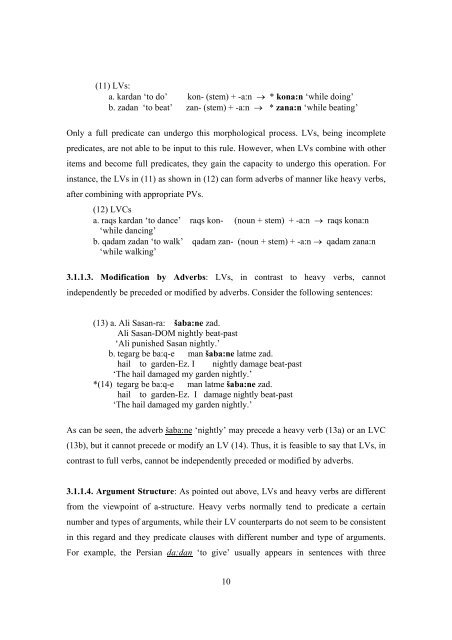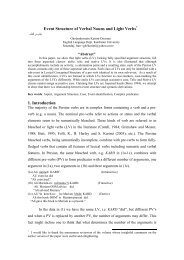Separability of Light Verb Constructions in Persian*
Separability of Light Verb Constructions in Persian*
Separability of Light Verb Constructions in Persian*
You also want an ePaper? Increase the reach of your titles
YUMPU automatically turns print PDFs into web optimized ePapers that Google loves.
(11) LVs:<br />
a. kardan ‘to do’ kon- (stem) + -a:n → * kona:n ‘while do<strong>in</strong>g’<br />
b. zadan ‘to beat’ zan- (stem) + -a:n → * zana:n ‘while beat<strong>in</strong>g’<br />
Only a full predicate can undergo this morphological process. LVs, be<strong>in</strong>g <strong>in</strong>complete<br />
predicates, are not able to be <strong>in</strong>put to this rule. However, when LVs comb<strong>in</strong>e with other<br />
items and become full predicates, they ga<strong>in</strong> the capacity to undergo this operation. For<br />
<strong>in</strong>stance, the LVs <strong>in</strong> (11) as shown <strong>in</strong> (12) can form adverbs <strong>of</strong> manner like heavy verbs,<br />
after comb<strong>in</strong><strong>in</strong>g with appropriate PVs.<br />
(12) LVCs<br />
a. raqs kardan ‘to dance’ raqs kon- (noun + stem) + -a:n → raqs kona:n<br />
‘while danc<strong>in</strong>g’<br />
b. qadam zadan ‘to walk’ qadam zan- (noun + stem) + -a:n → qadam zana:n<br />
‘while walk<strong>in</strong>g’<br />
3.1.1.3. Modification by Adverbs: LVs, <strong>in</strong> contrast to heavy verbs, cannot<br />
<strong>in</strong>dependently be preceded or modified by adverbs. Consider the follow<strong>in</strong>g sentences:<br />
(13) a. Ali Sasan-ra: šaba:ne zad.<br />
Ali Sasan-DOM nightly beat-past<br />
‘Ali punished Sasan nightly.’<br />
b. tegarg be ba:q-e man šaba:ne latme zad.<br />
hail to garden-Ez. I nightly damage beat-past<br />
‘The hail damaged my garden nightly.’<br />
*(14) tegarg be ba:q-e man latme šaba:ne zad.<br />
hail to garden-Ez. I damage nightly beat-past<br />
‘The hail damaged my garden nightly.’<br />
As can be seen, the adverb šaba:ne ‘nightly’ may precede a heavy verb (13a) or an LVC<br />
(13b), but it cannot precede or modify an LV (14). Thus, it is feasible to say that LVs, <strong>in</strong><br />
contrast to full verbs, cannot be <strong>in</strong>dependently preceded or modified by adverbs.<br />
3.1.1.4. Argument Structure: As po<strong>in</strong>ted out above, LVs and heavy verbs are different<br />
from the viewpo<strong>in</strong>t <strong>of</strong> a-structure. Heavy verbs normally tend to predicate a certa<strong>in</strong><br />
number and types <strong>of</strong> arguments, while their LV counterparts do not seem to be consistent<br />
<strong>in</strong> this regard and they predicate clauses with different number and type <strong>of</strong> arguments.<br />
For example, the Persian da:dan ‘to give’ usually appears <strong>in</strong> sentences with three<br />
10



